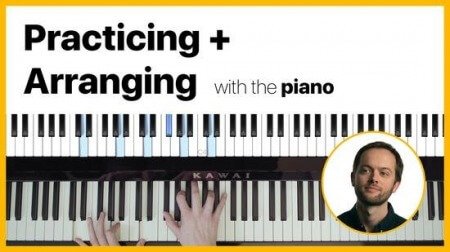SkillShare Music Composition: Practicing and Arranging with The Piano

The aim of this course is to help composers arrange more fluently at the piano by focusing on practicing the fundamental patterns of arrangement. By taking this course you will enhance your composing and arranging skills, as well as becoming a better piano player.
My name's Jack Vaughan. I'm a composer and online educator and founder of LeanMusician.com. My courses have been taken by thousands of students in nearly 100 countries and my main thing is helping musicians write and practice music more effectively.
This is not a beginners course. This course follows on from my previous course, Music Composition at the Piano. The aim of that course was to give beginner musicians an amazing foundation in music theory and composition - or to give intermediate musicians a catchup on all the things they often miss. If you haven't taken that course, or don't feel totally confident with your level of music theory as it currently stands - then check it out before taking this one.
Performing musicians practice - all the time. That's how they get better. But how do you practice if you're a composer? After you've mastered a good level of music theory, and some basic keyboard skills - how do you really start absorbing new techniques & material and move from being an intermediate to professional?
In my experience, there's two conventional bits of wisdom that professional composers usually say in answer to this: write lots of music on the job and listen to new music all the time.
Both of these are absolutely true and probably the best bits of advice you can get. If you're not already doing them, stop watching this video and do that solidly for a week and see what happens.
However, my guess is that you're already doing this, and it's not answering all your questions. The thing is, most early stage composers get stuck when writing - quite a lot. And it's really an issue of vocabulary.
Imagine I'm trying to write in french but my level of vocabulary is limited - my writing is not going to be so good - no matter how much I write. Obviously I need to learn more words or standard patterns in the language and then try them out in my writing.
I could also try and read or listen to as much french as possible - but how much do I actually recognise and therefore absorb for my own writing?
This is a perfect analogy for music. How can we write without a basic vocabulary of patterns and how can we emulate what we're listening to if we can't understand it?
In language learning, there is a well known hack or trick to pushing through this stage much quicker than the average learner and it's to find the top 300 most used words or patterns in the language and to learn those first.
THIS is what we're doing in this course - except, obviously - we're doing it in music not french! This course teaches you the fundamental patterns of arranging in music in a practical way - at the piano. When you have these patterns under your belt you can:
#1 Start combining and manipulating them in many different ways.
#2 You start hearing these patterns everywhere! Which shows you music isn't as hard as you thought!
#3 You can deconstruct your favorite music and emulate it with ease
#4 You can develop musical ideas with ease and finally start finishing that pile of sketches that you have been building up! : )
My hope is that at the end of this course you'll have built up and continue to be building a powerful skillset at the piano and have a wealth of arranging principles on which to draw from. And my hope is that these two pillars will allow you to express your compositional ideas more fluently and more reliably.
Home page
DOWNLOAD
